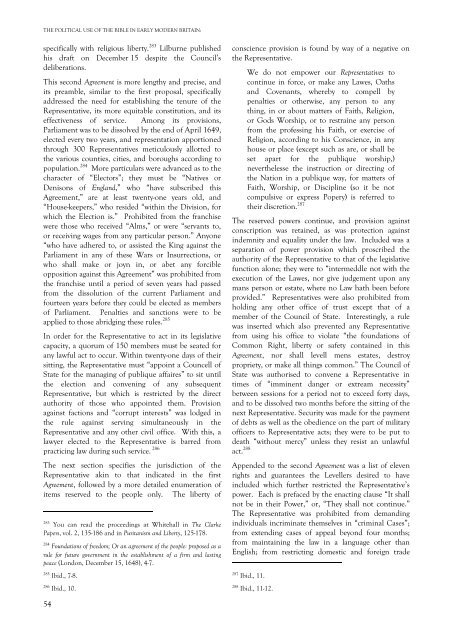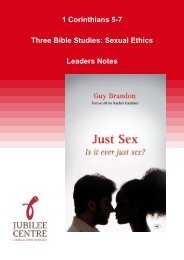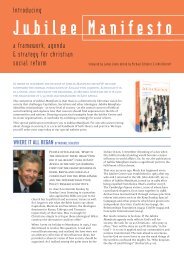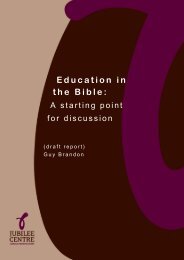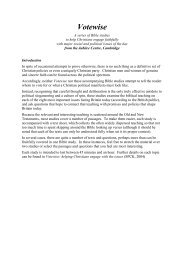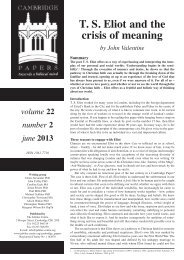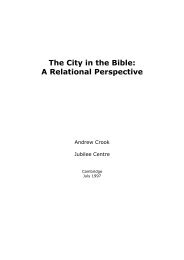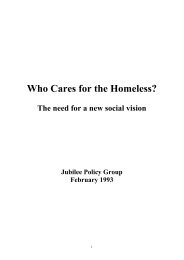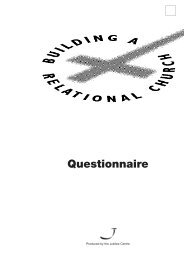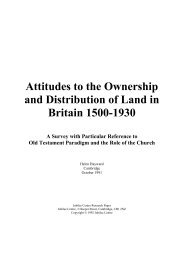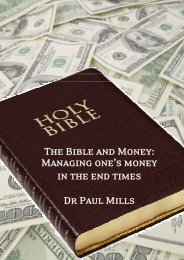Report Template - Jubilee Centre
Report Template - Jubilee Centre
Report Template - Jubilee Centre
Create successful ePaper yourself
Turn your PDF publications into a flip-book with our unique Google optimized e-Paper software.
THE POLITICAL USE OF THE BIBLE IN EARLY MODERN BRITAIN:<br />
specifically with religious liberty. 283 Lilburne published<br />
his draft on December 15 despite the Council’s<br />
deliberations.<br />
This second Agreement is more lengthy and precise, and<br />
its preamble, similar to the first proposal, specifically<br />
addressed the need for establishing the tenure of the<br />
Representative, its more equitable constitution, and its<br />
effectiveness of service. Among its provisions,<br />
Parliament was to be dissolved by the end of April 1649,<br />
elected every two years, and representation apportioned<br />
through 300 Representatives meticulously allotted to<br />
the various counties, cities, and boroughs according to<br />
population. 284 More particulars were advanced as to the<br />
character of “Electors”; they must be “Natives or<br />
Denisons of England,” who “have subscribed this<br />
Agreement,” are at least twenty-one years old, and<br />
“House-keepers,” who resided “within the Division, for<br />
which the Election is.” Prohibited from the franchise<br />
were those who received “Alms,” or were “servants to,<br />
or receiving wages from any particular person.” Anyone<br />
“who have adhered to, or assisted the King against the<br />
Parliament in any of these Wars or Insurrections, or<br />
who shall make or joyn in, or abet any forcible<br />
opposition against this Agreement” was prohibited from<br />
the franchise until a period of seven years had passed<br />
from the dissolution of the current Parliament and<br />
fourteen years before they could be elected as members<br />
of Parliament. Penalties and sanctions were to be<br />
applied to those abridging these rules. 285<br />
In order for the Representative to act in its legislative<br />
capacity, a quorum of 150 members must be seated for<br />
any lawful act to occur. Within twenty-one days of their<br />
sitting, the Representative must “appoint a Councell of<br />
State for the managing of publique affaires” to sit until<br />
the election and convening of any subsequent<br />
Representative, but which is restricted by the direct<br />
authority of those who appointed them. Provision<br />
against factions and “corrupt interests” was lodged in<br />
the rule against serving simultaneously in the<br />
Representative and any other civil office. With this, a<br />
lawyer elected to the Representative is barred from<br />
practicing law during such service. 286<br />
The next section specifies the jurisdiction of the<br />
Representative akin to that indicated in the first<br />
Agreement, followed by a more detailed enumeration of<br />
items reserved to the people only. The liberty of<br />
283<br />
You can read the proceedings at Whitehall in The Clarke<br />
Papers, vol. 2, 135-186 and in Puritanism and Liberty, 125-178.<br />
284<br />
Foundations of freedom; Or an agreement of the people: proposed as a<br />
rule for future government in the establishment of a firm and lasting<br />
peace (London, December 15, 1648), 4-7.<br />
285<br />
Ibid., 7-8.<br />
286<br />
Ibid., 10.<br />
conscience provision is found by way of a negative on<br />
the Representative.<br />
We do not empower our Representatives to<br />
continue in force, or make any Lawes, Oaths<br />
and Covenants, whereby to compell by<br />
penalties or otherwise, any person to any<br />
thing, in or about matters of Faith, Religion,<br />
or Gods Worship, or to restraine any person<br />
from the professing his Faith, or exercise of<br />
Religion, according to his Conscience, in any<br />
house or place (except such as are, or shall be<br />
set apart for the publique worship,)<br />
neverthelesse the instruction or directing of<br />
the Nation in a publique way, for matters of<br />
Faith, Worship, or Discipline (so it be not<br />
compulsive or express Popery) is referred to<br />
their discretion. 287<br />
The reserved powers continue, and provision against<br />
conscription was retained, as was protection against<br />
indemnity and equality under the law. Included was a<br />
separation of power provision which proscribed the<br />
authority of the Representative to that of the legislative<br />
function alone; they were to “intermeddle not with the<br />
execution of the Lawes, nor give judgement upon any<br />
mans person or estate, where no Law hath been before<br />
provided.” Representatives were also prohibited from<br />
holding any other office of trust except that of a<br />
member of the Council of State. Interestingly, a rule<br />
was inserted which also prevented any Representative<br />
from using his office to violate “the foundations of<br />
Common Right, liberty or safety contained in this<br />
Agreement, nor shall levell mens estates, destroy<br />
propriety, or make all things common.” The Council of<br />
State was authorised to convene a Representative in<br />
times of “imminent danger or extream necessity”<br />
between sessions for a period not to exceed forty days,<br />
and to be dissolved two months before the sitting of the<br />
next Representative. Security was made for the payment<br />
of debts as well as the obedience on the part of military<br />
officers to Representative acts; they were to be put to<br />
death “without mercy” unless they resist an unlawful<br />
act. 288<br />
Appended to the second Agreement was a list of eleven<br />
rights and guarantees the Levellers desired to have<br />
included which further restricted the Representative’s<br />
power. Each is prefaced by the enacting clause “It shall<br />
not be in their Power,” or, “They shall not continue.”<br />
The Representative was prohibited from demanding<br />
individuals incriminate themselves in “criminal Cases”;<br />
from extending cases of appeal beyond four months;<br />
from maintaining the law in a language other than<br />
English; from restricting domestic and foreign trade<br />
287<br />
Ibid., 11.<br />
288<br />
Ibid., 11-12.<br />
54


